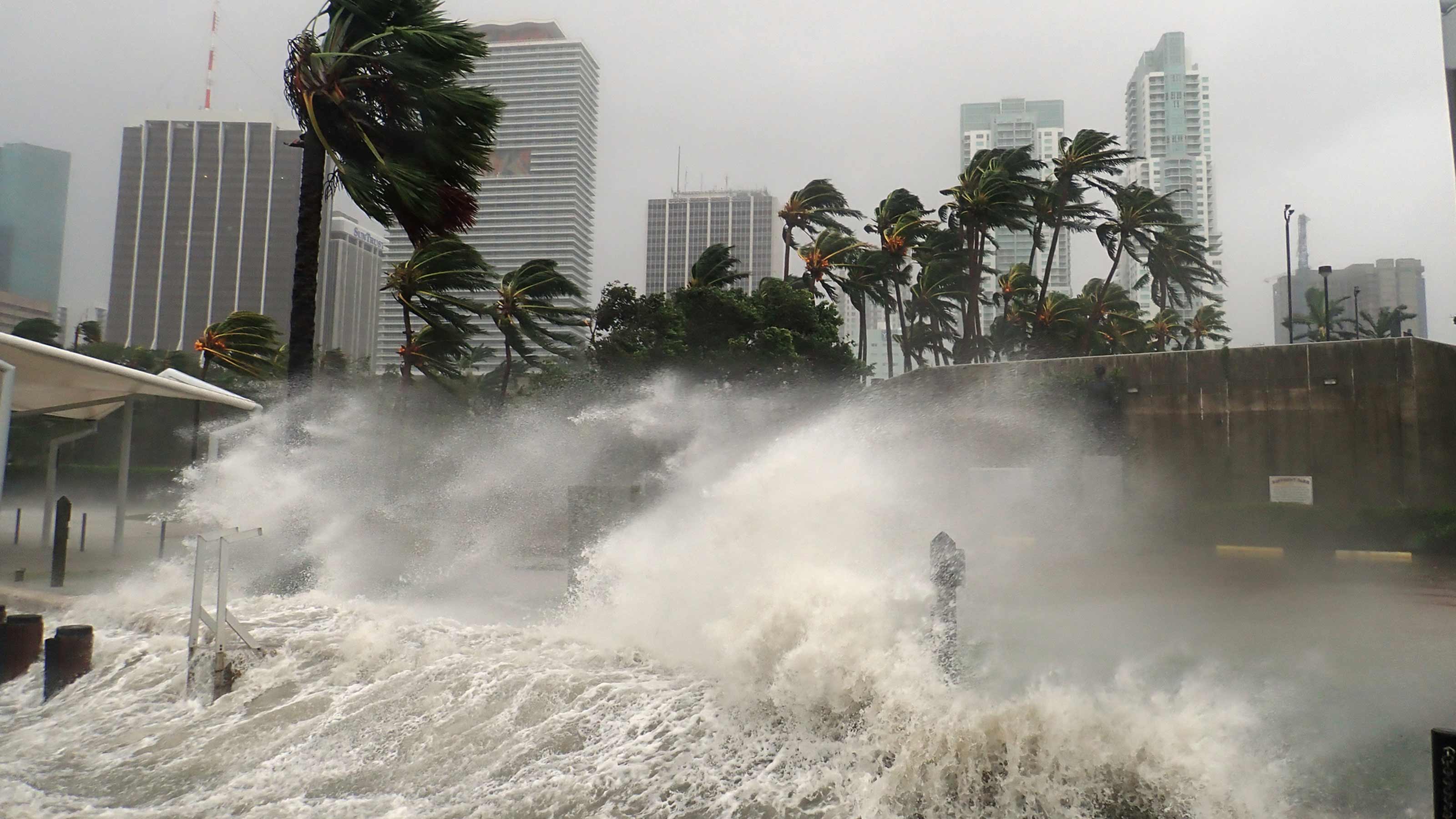Hurricane Season: Home, Family and Financial Planning Tips
Hurricane season officially began on June 1, and it runs through Nov. 30. So get ready now, in the calm before the storms.


Profit and prosper with the best of Kiplinger's advice on investing, taxes, retirement, personal finance and much more. Delivered daily. Enter your email in the box and click Sign Me Up.
You are now subscribed
Your newsletter sign-up was successful
Want to add more newsletters?

Delivered daily
Kiplinger Today
Profit and prosper with the best of Kiplinger's advice on investing, taxes, retirement, personal finance and much more delivered daily. Smart money moves start here.

Sent five days a week
Kiplinger A Step Ahead
Get practical help to make better financial decisions in your everyday life, from spending to savings on top deals.

Delivered daily
Kiplinger Closing Bell
Get today's biggest financial and investing headlines delivered to your inbox every day the U.S. stock market is open.

Sent twice a week
Kiplinger Adviser Intel
Financial pros across the country share best practices and fresh tactics to preserve and grow your wealth.

Delivered weekly
Kiplinger Tax Tips
Trim your federal and state tax bills with practical tax-planning and tax-cutting strategies.

Sent twice a week
Kiplinger Retirement Tips
Your twice-a-week guide to planning and enjoying a financially secure and richly rewarding retirement

Sent bimonthly.
Kiplinger Adviser Angle
Insights for advisers, wealth managers and other financial professionals.

Sent twice a week
Kiplinger Investing Weekly
Your twice-a-week roundup of promising stocks, funds, companies and industries you should consider, ones you should avoid, and why.

Sent weekly for six weeks
Kiplinger Invest for Retirement
Your step-by-step six-part series on how to invest for retirement, from devising a successful strategy to exactly which investments to choose.
Believe it or not, hurricane season is here. Preparing early while you have the time can save you the stress of having to panic when a storm is right around the corner. The need for preparation couldn’t be clearer in the wake of the gasoline panic buying we’ve just witnessed after the recent pipeline hack, and who could forget the run on toilet paper at the beginning of the COVID-19 outbreak?
Below are some planning ideas you can put in place in advance of a storm. Basically, you’ll want to be ready in case you have no power or water for a week or longer.
Home and Family Planning
- Store enough non-perishable food and water for at least three to seven days for your family. You may want to fill up the bathtub or other large containers with extra water for washing dishes and flushing toilets.
- Have cash handy. If the power is out, ATMs will not work (nor will credit cards) and you may need cash for essentials.
- Having a battery-powered or solar-powered radio can be helpful, so you can keep abreast of what is going on outside.
- Declutter. Secure outside furniture or any items that can become projectiles. In addition, cut down trees that could damage your home or your neighbors’ property.
- If you don’t have hurricane impact windows, make sure your shutters are functional.
- Charge electronics, buy back-up devices and have flashlights and replacement batteries on hand.
- Have enough food and supplies for children and pets – don’t forget the entertainment, including games and toys!
- Fill any important prescription medications so you have ample supply in the event you cannot get to the pharmacy or doctor.
- Buying or preparing a first aid kit or emergency bag may be helpful – you can find these bags on Amazon for under $100. You can create a larger kit for staying at home and a smaller kit in the event you have to evacuate.
- Plan for family members with disabilities and chronic illnesses. Many medical devices need power supplies.
- Fill up all your cars and make sure you have enough fuel for generators.
- Talk to family members to decide how you will contact each other and what your plan will be in an emergency. Write down important phone numbers and store them with your important documents — most of us don’t remember phone numbers in our heads anymore, and if you lose power and your cellphone battery dies you won’t have access to your contacts anymore. Make a list of emergency phone numbers and family physicians. Some ideas can be found here: http://www.ek-ff.com/Organizer.pdf
- Secure boats and RVs. If you have a swimming pool, check the fence around it and the safety net or pool cover. Consider a pool alarm in the event the fence blows down, as swimming pools can pose a danger to children and pets, especially after a storm.
Financial
- Review your homeowners and flood insurance to make sure you have adequate coverage now, well before any storms even form. Real estate values have gone up considerably in some areas, so make sure your policy has kept up with home values and replacement costs.
- Store important documents on secure cloud storage services so you can access them remotely later. You may want to store your insurance policies and any other important home-related documents. At Evensky & Katz we provide all our clients with their own client portal document vaults where they can securely store important documents.
- Buy a waterproof case for personal documents, such as marriage certificates, birth certificates and passports – something that can be grabbed quickly if you have to evacuate. As backup you may want to scan these documents and save copies in a password-protected file.
- Secure valuables, such as jewelry and sentimental memorabilia (old photos and heirlooms). Possibly store them in a safe deposit box or fireproof/waterproof safe.
- Most insurance policies have a 2% hurricane deductible, so make sure you have enough cash set aside in the event you need to come up with these funds for urgent repairs. Insurance companies may take awhile to send adjusters and process claims.
- If you own a business, make sure you have a continuity plan in place.
Since we are still in a pandemic this website may be useful:
From just $107.88 $24.99 for Kiplinger Personal Finance
Become a smarter, better informed investor. Subscribe from just $107.88 $24.99, plus get up to 4 Special Issues

Sign up for Kiplinger’s Free Newsletters
Profit and prosper with the best of expert advice on investing, taxes, retirement, personal finance and more - straight to your e-mail.
Profit and prosper with the best of expert advice - straight to your e-mail.
Other useful websites:
- https://www.miamidade.gov/global/emergency/hurricane/home.page
- https://www.ready.gov/hurricanes
- http://www.floridadisaster.org/
Profit and prosper with the best of Kiplinger's advice on investing, taxes, retirement, personal finance and much more. Delivered daily. Enter your email in the box and click Sign Me Up.

Roxanne Alexander is a senior financial adviser with Evensky & Katz/Foldes Financial handling client analysis on investments, insurance, annuities, college planning and developing investment policies. Prior to this, she was a senior vice president at Evensky & Katz working with both individual and institutional clients. She has a bachelor’s in accounting and business management from the University of the West Indies, she received an MBA at the University of Miami in finance and investments.
-
 Nasdaq Leads a Rocky Risk-On Rally: Stock Market Today
Nasdaq Leads a Rocky Risk-On Rally: Stock Market TodayAnother worrying bout of late-session weakness couldn't take down the main equity indexes on Wednesday.
-
 Quiz: Do You Know How to Avoid the "Medigap Trap?"
Quiz: Do You Know How to Avoid the "Medigap Trap?"Quiz Test your basic knowledge of the "Medigap Trap" in our quick quiz.
-
 5 Top Tax-Efficient Mutual Funds for Smarter Investing
5 Top Tax-Efficient Mutual Funds for Smarter InvestingMutual funds are many things, but "tax-friendly" usually isn't one of them. These are the exceptions.
-
 Social Security Break-Even Math Is Helpful, But Don't Let It Dictate When You'll File
Social Security Break-Even Math Is Helpful, But Don't Let It Dictate When You'll FileYour Social Security break-even age tells you how long you'd need to live for delaying to pay off, but shouldn't be the sole basis for deciding when to claim.
-
 I'm an Opportunity Zone Pro: This Is How to Deliver Roth-Like Tax-Free Growth (Without Contribution Limits)
I'm an Opportunity Zone Pro: This Is How to Deliver Roth-Like Tax-Free Growth (Without Contribution Limits)Investors who combine Roth IRAs, the gold standard of tax-free savings, with qualified opportunity funds could enjoy decades of tax-free growth.
-
 One of the Most Powerful Wealth-Building Moves a Woman Can Make: A Midcareer Pivot
One of the Most Powerful Wealth-Building Moves a Woman Can Make: A Midcareer PivotIf it feels like you can't sustain what you're doing for the next 20 years, it's time for an honest look at what's draining you and what energizes you.
-
 I'm a Wealth Adviser Obsessed With Mahjong: Here Are 8 Ways It Can Teach Us How to Manage Our Money
I'm a Wealth Adviser Obsessed With Mahjong: Here Are 8 Ways It Can Teach Us How to Manage Our MoneyThis increasingly popular Chinese game can teach us not only how to help manage our money but also how important it is to connect with other people.
-
 Looking for a Financial Book That Won't Put Your Young Adult to Sleep? This One Makes 'Cents'
Looking for a Financial Book That Won't Put Your Young Adult to Sleep? This One Makes 'Cents'"Wealth Your Way" by Cosmo DeStefano offers a highly accessible guide for young adults and their parents on building wealth through simple, consistent habits.
-
 Global Uncertainty Has Investors Running Scared: This Is How Advisers Can Reassure Them
Global Uncertainty Has Investors Running Scared: This Is How Advisers Can Reassure ThemHow can advisers reassure clients nervous about their plans in an increasingly complex and rapidly changing world? This conversational framework provides the key.
-
 I'm a Real Estate Investing Pro: This Is How to Use 1031 Exchanges to Scale Up Your Real Estate Empire
I'm a Real Estate Investing Pro: This Is How to Use 1031 Exchanges to Scale Up Your Real Estate EmpireSmall rental properties can be excellent investments, but you can use 1031 exchanges to transition to commercial real estate for bigger wealth-building.
-
 Should You Jump on the Roth Conversion Bandwagon? A Financial Adviser Weighs In
Should You Jump on the Roth Conversion Bandwagon? A Financial Adviser Weighs InRoth conversions are all the rage, but what works well for one household can cause financial strain for another. This is what you should consider before moving ahead.